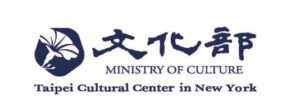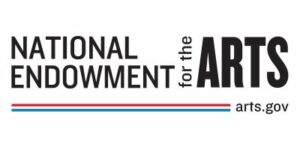
Cocktails, art, and music make a heady mix during K2 Friday Nights, where admission is free every Friday from 6:00 to 10:00 PM.
- Café Serai becomes the K2 Lounge, offering a special drink menu to accompany the evening’s DJ, Snkr Joe.
- Arrive early for 2-for-1 drinks from 6:00 to 7:00 PM.
- Explore all the galleries, dive deeper with an exhibition tour at 7:15 PM, and kick off your weekend with the Rubin.
Coming with friends? Learn about group reservations and tours.
About the DJ
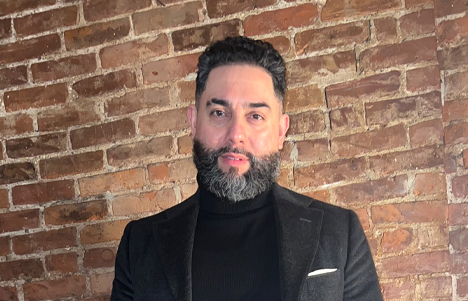
Snkr Joe is well known for his contributions as a pioneer in the online sneaker community and as a founder of one of the best all-vinyl, all-45 parties, Mobile Mondays. His passion for DJing dates back to 1992 when he studied the art of mixing records. What started out as a hobby is now a full-time profession as an open-format DJ playing at New York City’s hottest speakeasies, hotels, lounges, restaurants, and bars, such as Nothing Really Matters, Not A Speakeasy, The UES (Ice-Cream Shoppe speakeasy), The Back Room, Mr. Purple (Hotel Indigo), Nina’s x Liquid Lab (NoMo SoHo hotel), and Buddha-Bar Restaurant.
“Setting the vibe for a room that makes people smile, dance, and laugh is rewarding to me. All of these reactions tell me that I have done my job.”
Lead support for the Rubin Museum is provided by Bob and Lois Baylis, Barbara Bowman, E. Rhodes and Leona B. Carpenter Foundation, Dharma Joy Foundation, Noah P. Dorsky, Fred Eychaner, Christopher J. Fussner, Agnes Gund, The Robert H. N. Ho Family Foundation Global, the Estate of Lisina M. Hoch, Henry Luce Foundation, The Pierre and Tana Matisse Foundation, Mellon Foundation, Matt and Ann Nimetz, The Randleigh Foundation Trust, Shelley and Donald Rubin, Tiger Baron Foundation, and Ellen Bayard Weedon Foundation.
General operating support of the Rubin Museum of Art is provided by the Milton and Sally Avery Arts Foundation, Alex J. Ettl Foundation, Daphne Hoch Cunningham and John Cunningham, Anne E. Delaney, Dalio Philanthropies, Dan Gimbel of NEPC, LLC, The Prospect Hill Foundation, Basha Frost Rubin and Scott Grinsell, Namita and Arun Saraf, Linda Schejola, Eric and Alexandra Schoenberg, Eileen Caulfield Schwab, Jesse Smith and Annice Kenan, Tsherin Sherpa, Tong-Tong Zhu and Jianing Liu, with generous donations from the Museum’s Board of Trustees, individual donors and members, and corporate and foundation supporters.
This program is supported, in part, by public funds from the New York City Department of Cultural Affairs, in partnership with the City Council.
The Rubin Museum’s programs are made possible by the New York State Council on the Arts with the support of the Office of Governor Kathy Hochul and the New York State Legislature.


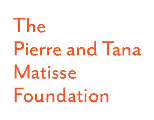


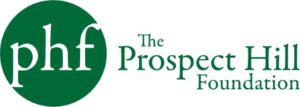


Photo by Filip Wolak
Cocktails, art, and music make a heady mix during K2 Friday Nights, where admission is free every Friday from 6:00 to 10:00 PM.
- Café Serai becomes the K2 Lounge, offering a drink menu to accompany the evening’s DJ, Gigi Gray.
- Arrive early for 2-for-1 drinks from 6:00 to 7:00 PM.
- Explore all the galleries, dive deeper with an exhibition tour at 7:15 PM, and kick off your weekend with the Rubin.
Coming with friends? Learn about group reservations and tours.
About the DJ
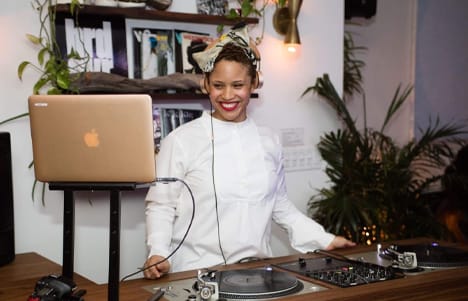
A Seattle native with a New York spirit, Gigi Gray blends R&B, soul, funk, reggae, and pop. The DJ, writer, world traveler, and fashion enthusiast is a woman who goes after her dreams and hopes to leave her crowds a little happier than when they first arrived. Prepare to feel good and take a trip down memory lane with Gigi and her sound selection.
Lead support for the Rubin Museum is provided by Bob and Lois Baylis, Barbara Bowman, E. Rhodes and Leona B. Carpenter Foundation, Dharma Joy Foundation, Noah P. Dorsky, Fred Eychaner, Christopher J. Fussner, Agnes Gund, The Robert H. N. Ho Family Foundation Global, the Estate of Lisina M. Hoch, Henry Luce Foundation, The Pierre and Tana Matisse Foundation, Mellon Foundation, Matt and Ann Nimetz, The Randleigh Foundation Trust, Shelley and Donald Rubin, Tiger Baron Foundation, and Ellen Bayard Weedon Foundation.
General operating support of the Rubin Museum of Art is provided by the Milton and Sally Avery Arts Foundation, Alex J. Ettl Foundation, Daphne Hoch Cunningham and John Cunningham, Anne E. Delaney, Dalio Philanthropies, Dan Gimbel of NEPC, LLC, The Prospect Hill Foundation, Basha Frost Rubin and Scott Grinsell, Namita and Arun Saraf, Linda Schejola, Eric and Alexandra Schoenberg, Eileen Caulfield Schwab, Jesse Smith and Annice Kenan, Tsherin Sherpa, Tong-Tong Zhu and Jianing Liu, with generous donations from the Museum’s Board of Trustees, individual donors and members, and corporate and foundation supporters.
This program is supported, in part, by public funds from the New York City Department of Cultural Affairs, in partnership with the City Council.
The Rubin Museum’s programs are made possible by the New York State Council on the Arts with the support of the Office of Governor Kathy Hochul and the New York State Legislature.








Photo by Filip Wolak
Cocktails, art, and music make a heady mix during K2 Friday Nights, where admission is free every Friday from 6:00 to 10:00 PM.
- Café Serai becomes the K2 Lounge, offering a special drink menu to accompany the evening’s DJ, Joey Greiner.
- Arrive early for 2-for-1 drinks from 6:00 to 7:00 PM.
- Explore all the galleries, dive deeper with an exhibition tour at 7:15 PM, and kick off your weekend with the Rubin.
Coming with friends? Learn about group reservations and tours.
About the DJ

Joey Greiner has been moving dance floors for over 15 years in his native New York City, across the US, and Europe. He weaves deep and funky grooves with Afro and Latin rhythms to lead you on a journey into your most primal instincts to move your body. His wildly popular Tribal Disco party infuses live instruments and performances with energetic DJ sets, creating an unforgettable interactive experience for the crowd.
Lead support for the Rubin Museum is provided by Bob and Lois Baylis, Barbara Bowman, E. Rhodes and Leona B. Carpenter Foundation, Dharma Joy Foundation, Noah P. Dorsky, Fred Eychaner, Christopher J. Fussner, Agnes Gund, The Robert H. N. Ho Family Foundation Global, the Estate of Lisina M. Hoch, Henry Luce Foundation, The Pierre and Tana Matisse Foundation, Mellon Foundation, Matt and Ann Nimetz, The Randleigh Foundation Trust, Shelley and Donald Rubin, Tiger Baron Foundation, and Ellen Bayard Weedon Foundation.
General operating support of the Rubin Museum of Art is provided by the Milton and Sally Avery Arts Foundation, Alex J. Ettl Foundation, Daphne Hoch Cunningham and John Cunningham, Anne E. Delaney, Dalio Philanthropies, Dan Gimbel of NEPC, LLC, The Prospect Hill Foundation, Basha Frost Rubin and Scott Grinsell, Namita and Arun Saraf, Linda Schejola, Eric and Alexandra Schoenberg, Eileen Caulfield Schwab, Jesse Smith and Annice Kenan, Tsherin Sherpa, Tong-Tong Zhu and Jianing Liu, with generous donations from the Museum’s Board of Trustees, individual donors and members, and corporate and foundation supporters.
This program is supported, in part, by public funds from the New York City Department of Cultural Affairs, in partnership with the City Council.
The Rubin Museum’s programs are made possible by the New York State Council on the Arts with the support of the Office of Governor Kathy Hochul and the New York State Legislature.








Photo by Filip Wolak
Join us for a live musical performance on the Rubin stage by a trio of musicians from Brooklyn Raga Massive, a collective dedicated to creating cross-cultural understanding through the lens of Indian classical music. Raga means “to color the mind.” The music is subtle and precise in order to capture a specific mood to match a particular time of day or season.
Featuring sonic convergences and diasporic detours from regions along the silk road—from Mongolia to South Asia—the performance brings together folk and traditional lineages of Indian classical raga with electronic and contemporary influences. With classical tabla, sarod/guitar, and vocals, this set promises to conjure a reimagined metropolis that colors your mind with Indian raga and Mongolian dreamscapes.
About the Performers
Camila Celin (pictured right) began playing guitar at age nine. For several years, she has been doing intensive studies in the Indian sarod, in Kolkata with sarod player Sougata Roy Choudhury and in New York with sitar maestro Pandit Krishna Bhatt. In 2009 she was nominated for a Grammy for best world music album in collaboration with slide guitar maestro Debashish Bhattacharya. She has been an active performer in her native Colombia, the U.S. and India. Camila has composed music for several films, for theater as well as for commercials and lives between New York City and Kolkata, India.
Uyanga Bold, (pictured center) is a unique singer with a rare blend of resonance strategies, seamlessly incorporating “open throat singing” of Mongolian urtiin duu and Balkan female folk singers, alongside operatic bel canto elegance, and shamanic throat singing. Her rich palette of melismatic colors and ornaments from global traditions are rooted in a lifetime of rigorous training and practice. Inana’s research has led her from the Amazonian rainforests to learning from Hindustani classical masters, professionally exploring and stretching the possibilities of the human voice. Hailing from Mongolia, the singer is featured in Disney’s remake of Mulan, as well as in the Avatar and Spider-Man franchises. Forbes says “her voice harkens back to ancient civilizations,” and she has been nominated as “Female Singer of the Year.” She has appeared internationally on television, radio, and in live performances, reaching over 40 million views across all platforms.
Roshni Samlal (pictured left) is a New York-based tabla player, DJ, producer, curator and poet of Trinidadian descent. As a classically trained tabla artist, Roshni performs traditional tabla solos, South Asian classical accompaniment, jazz and chamber composition. She also uses electronic music production and poetry as contexts to reframe the tabla solo within an experimental narrative lens. She is the lead curator and producer of the Ragini Festival which focuses on spotlighting the work of artists engaged in traditional folk and innovative arts within the further reaches of the South Asian diaspora, focusing on Indo-Caribbean heritage. Her DJ sets are rooted in her diasporic heritage as a Trinidadian immigrant during the 90’s, Global club, Bollywood, Chutney, Soca, Electronics, Dancehall and Dub. Her work has been supported and showcased at GlobalFest, Ragas Live Festival, Lincoln Center, Celebrate Brooklyn, True/False Film Festival, Brookfield Place, Rubin Museum, Accordions of the World Festival, Joe’s Pub(Working Group Member 2022-2023), New Music USA, Pioneer Works, and Brooklyn Museum.
Lead support for the Rubin Museum is provided by Bob and Lois Baylis, Barbara Bowman, E. Rhodes and Leona B. Carpenter Foundation, Dharma Joy Foundation, Noah P. Dorsky, Fred Eychaner, Christopher J. Fussner, Agnes Gund, The Robert H. N. Ho Family Foundation Global, the Estate of Lisina M. Hoch, Henry Luce Foundation, The Pierre and Tana Matisse Foundation, Mellon Foundation, Matt and Ann Nimetz, The Randleigh Foundation Trust, Shelley and Donald Rubin, Tiger Baron Foundation, and Ellen Bayard Weedon Foundation.
General operating support of the Rubin Museum of Art is provided by the Milton and Sally Avery Arts Foundation, Alex J. Ettl Foundation, Daphne Hoch Cunningham and John Cunningham, Anne E. Delaney, Dalio Philanthropies, Dan Gimbel of NEPC, LLC, The Prospect Hill Foundation, Basha Frost Rubin and Scott Grinsell, Namita and Arun Saraf, Linda Schejola, Eric and Alexandra Schoenberg, Eileen Caulfield Schwab, Jesse Smith and Annice Kenan, Tsherin Sherpa, Tong-Tong Zhu and Jianing Liu, with generous donations from the Museum’s Board of Trustees, individual donors and members, and corporate and foundation supporters.
This program is supported, in part, by public funds from the New York City Department of Cultural Affairs, in partnership with the City Council.
The Rubin Museum’s programs are made possible by the New York State Council on the Arts with the support of the Office of Governor Kathy Hochul and the New York State Legislature.








Join us for an unforgettable evening celebrating the Rubin Museum’s momentous 20th anniversary and bold launch as a global museum, during which we will honor the remarkable vision of founders Shelley and Donald Rubin and award the first-ever Rubin Museum Himalayan Art Prize.
Become a sponsor and support the Rubin’s future! Your generosity promotes Himalayan art and cultures, offering visibility and recognition to living artists from the Himalayas, Asia, and diaspora while reaching and serving a larger global audience than ever before.
~View sponsorship opportunities (PDF) and purchase a ticket online.*
~Download and return our Reply Form (PDF) to pledge your support and pay via check, EFT wire transfer, or credit card.*
~Learn more about the Rubin’s exciting ongoing and future initiatives (PDF).
*Credit card fees apply.
Awarding the First Rubin Museum Himalayan Art Prize
We are passionate about increasing the visibility of promising artists and creatives from the Himalayan region and diaspora, and we will award the first-ever Rubin Museum Himalayan Art Prize at the Gala. The prize recognizes the work of an innovative individual or collective who has significantly contributed to creative and critically relevant dialogues between Himalayan art and contemporary life. The Rubin’s dedication to living artists from the region as well as the contemporary art field is paramount, and this honored prize, which includes an unrestricted cash gift, will be awarded annually.
Your Gift Will Be Matched—20th-Anniversary Challenge
Your Gala support will be doubled! To bolster the Rubin’s bold plans to bring Himalayan art to people wherever they live, one of our generous donors has offered to match all Gala donations through July 31 (up to $250,000). Your timely gift will help us reach our ambitious goal of $500,000. Just think what the Rubin can do—the lives we can touch, the curiosity we can inspire, and the impact we can make—locally, nationally, and internationally.
Our Gala Supporters
- Basha Frost Rubin and Scott Grinsell
- Bob and Lois Baylis
- Christopher J. Fussner
- Dan Gimbel of NEPC, LLC
- Eileen Caulfield Schwab
- New York Life
- Noah P. Dorsky
- Ravi and Ginny Akhoury
- RubinFrost LLC
- Shelley and Donald Rubin


With additional sponsorship from PFK O’Connor Davies

The sponsor list for Beyond the Spiral: A Gala Celebrating the Next 20 Years is in formation.
For more information about the Gala, please contact:
Teresa Bellantoni, Bowen & Co. Events, 914.231.6180/rubinmuseum@bowenandco.com
For questions about the Rubin Museum and our programs, please contact:
Natalie Cimino, Coordinator, Major Gifts & Institutional Philanthropy,(212) 620-5000 x203/ncimino@rubinmuseum.org
Cocktails, art, and music make a heady mix at our kick off to West Side Fest 2024!
- Café Serai becomes the K2 Lounge, offering a drink menu to accompany the evening’s special Ragini x Rubin DJ Lineup.
- Arrive early for 2-for-1 drinks from 6:00–7:00 PM.
- Explore all the galleries for free and dive deeper with a tour of Reimagine: Himalayan Art Now at 7:15 PM
Coming with friends? Learn about group reservations and tours.
For more details on West Side Fest, including the full schedule, visit westsidefest.nyc.
About the Ragini Festival
The Ragini Festival explores art, creative impetus, and mythology from a post-continental India. Life after colonialism revealed a fractured South Asian identity, which has morphed into post-colonial identities of Indo-Caribbean, Fijian, Mauritian, and more. Representing Ragini Festival’s curatorial mission to “explore music that both captures folk and traditional art born out of the migrations of indentureship” DJs Roshni Samlal, Zara Dekho, and offering rain will transport you into a trans-indies listening experience.
About the DJs
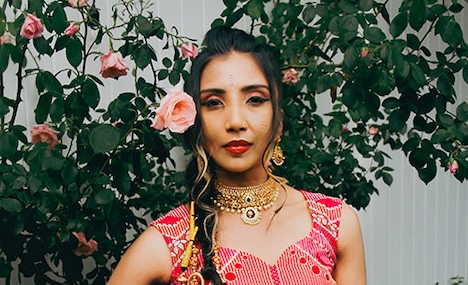
DJ Roshni Samlal is a New York–based tabla player who hails from the West Indies, where she was initiated into the ancient tradition of Indian classical music by her vocalist father. She has continued her tutelage in the Benares style of tabla, playing under Shri Tapan Modak and currently a student of the epic Farukhbad exponent Anindo Chatterjee. While her passion is Indian classical tabla, she has also played folk, jazz, and other genres. Samlal has performed at notable local venues such as Knitting Factory, Pianos, and The Bitter End.
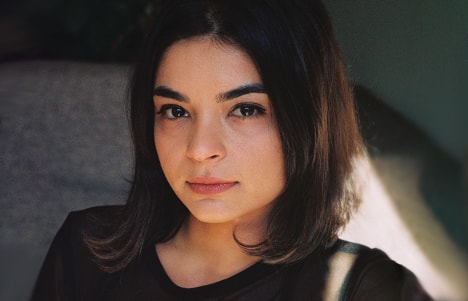
Zara Dekho is a DJ and curator based in Brooklyn, and raised in Karachi. She is the co-runner of Brooklyn party and label Rare Frequency Transmissions, and more recently cofounded Tarka, a project and event series celebrating the diaspora through food, music, performances, and arts. Zara Dekho’s sets exhibit a versatility impacted by time and space, spanning genres such as house, techno, bass, and electro while paying homage to sounds of her South Asian roots.
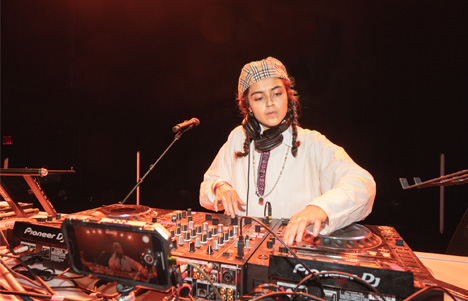
offering rain, of the Disco Auntie collective, seeks to be of service to spirit, harmony, and joy. offering rain infuses playful sounds from various genres and pairs them with poetic lyricism to create a raw, dynamic, and innovative approach to music making and storytelling. As a multicultural first-generation artist born and raised in New York/Lenape land, they create a genreless experience by pulling from their Indian and Ecuadorian roots and tying them to the remix, fusion, and culture of NYC. Using dub, reggaeton, soul, techno, and Bollywood styles, offering rain tells an authentic story of their experience in New York and the world.
Lead support for the Rubin Museum is provided by Bob and Lois Baylis, Barbara Bowman, E. Rhodes and Leona B. Carpenter Foundation, Dharma Joy Foundation, Noah P. Dorsky, Fred Eychaner, Christopher J. Fussner, Agnes Gund, The Robert H. N. Ho Family Foundation Global, the Estate of Lisina M. Hoch, Henry Luce Foundation, The Pierre and Tana Matisse Foundation, Mellon Foundation, Matt and Ann Nimetz, The Randleigh Foundation Trust, Shelley and Donald Rubin, Tiger Baron Foundation, and Ellen Bayard Weedon Foundation.
General operating support of the Rubin Museum of Art is provided by the Milton and Sally Avery Arts Foundation, Alex J. Ettl Foundation, Daphne Hoch Cunningham and John Cunningham, Anne E. Delaney, Dalio Philanthropies,, Dan Gimbel of NEPC, LLC, The Prospect Hill Foundation, Basha Frost Rubin and Scott Grinsell, Namita and Arun Saraf, Linda Schejola, Eric and Alexandra Schoenberg, Eileen Caulfield Schwab, Jesse Smith and Annice Kenan, Tsherin Sherpa, Tong-Tong Zhu and Jianing Liu, with generous donations from the Museum’s Board of Trustees, individual donors and members, and corporate and foundation supporters.
This program is supported, in part, by public funds from the New York City Department of Cultural Affairs, in partnership with the City Council.
The Rubin Museum’s programs are made possible by the New York State Council on the Arts with the support of the Office of Governor Kathy Hochul and the New York State Legislature.








Photo by Filip Wolak
Join us for a musical and meditative celebration of Himalayan and Hindustani cultures, featuring performances by Bhoomika Jain, a Hindustani classical singer; Pallavi Raisurana, a Hindustani classical dancer; and a transformative mindfulness meditation led by Lama Aria Drolma.
In honor of National Immigrant Heritage Month, celebrate community spirit and the themes of love, pride, and unity.
Light refreshments will be served. Each ticket holder will receive a Ganesh magnet souvenir.
This program is hosted by Tashi Chodron, Himalayan programs and communities ambassador at the Rubin.
About the Presenters
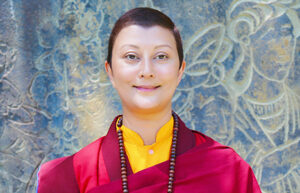
Lama Aria Drolma is an ordained Buddhist teacher in the Karma Kagyu tradition of Tibetan Buddhism and has completed over a decade of monastic study and meditation training. She is a graduate of the traditional Tibetan Buddhist retreat program spanning three years and three months, an advanced cloistered meditation training program affiliated with Palpung Sherabling monasteries.
Lama Aria Drolma teaches worldwide, leading retreats, workshops, and corporate meditation programs, and is a popular guest speaker at universities and organizations. She emphasizes Vajrayana Buddhism and Buddhist principles, making them relevant in our everyday lives, helping us to cultivate loving kindness and compassion, and bringing about a transformation of contentment and a genuine sense of well-being.
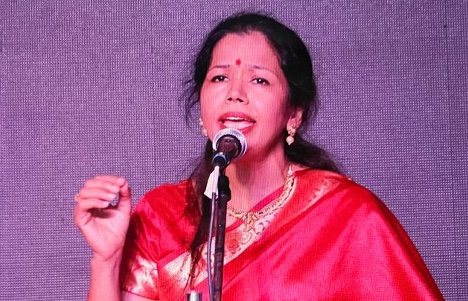
Bhoomika Jain is an accomplished artist who began her musical journey by singing for the All India Radio Yuvavani during her college years. Following the esteemed Guru Shishya Parampara, Bhoomika had the privilege of learning from renowned and talented masters of the Kirana and Mevati gharanas. Her dedication to her craft and her rich training background have made her a respected figure in the world of music.
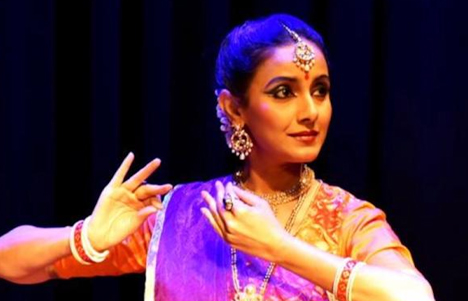
Pallavi Raisurana, founder of Anhad Nrityashala, and a disciple of Padmabhushan Smt. Kumudini Lakhia and Smt. Shama Bhate, advocates for the appreciation and integration of Indian classical arts in everyday life. With Kathak as her choice of expression, she seeks to revive the essence of traditional knowledge systems, dance, and music that are frequently overlooked by contemporary society. She achieves this through two means: performance and education. Pallavi has presented her work at home and abroad, including at the Indian Museum, Kolkata; the Metropolitan Museum of Art; Tribeca Performing Arts Center; and Mumbai Dance Season.
Major support for Himalayan Heritage is provided by The Frederick P. Lenz Foundation for American Buddhism.
Special support is provided by Heather B. Henson.
The Rubin Museum’s programs are made possible by the New York State Council on the Arts with support of the Office of Governor Kathy Hochul and the New York State Legislature, as well as by generous donations from the Museum’s Board of Trustees, individual donors, and members.

Image credit
Ganesha; Madhya Pradesh, India; 11th century; sandstone; Rubin Museum of Art; C2004.14.4 (HAR 65346)
We are thrilled to welcome Rubin members for a special reception in the Art Lounge on Friday, June 21. As a token of our gratitude, join us for an evening of indulgence, including complimentary drinks, passed delectable bites, and a special gift.
Before the event, we welcome you to join us for a talk in the galleries by Reimagine: Himalayan Art Now artist Shushank Shrestha. As part of our Artists on Art talk series, he will share the inspiration and experiences behind his work. Please note that this talk requires a separate registration.
We eagerly anticipate celebrating with you on this special evening. Please RSVP by sending an email to membership@rubinmuseum.org by Wednesday, June 19.
Reimagine: Himalayan Art Now is supported by Bob and Lois Baylis, Daphne Hoch Cunningham and John Cunningham, Noah P. Dorsky, Mimi Gardner Gates, Fred Eychaner, Jacques and Natasha Gelman Foundation, Dan Gimbel of NEPC, LLC, Agnes Gund, New York Life, Matt and Ann Nimetz, Namita and Arun Saraf, The Prospect Hill Foundation, Eileen Caulfield Schwab, Taipei Cultural Center in New York, and UOVO.
This program is supported, in part, by public funds from the New York City Department of Cultural Affairs, in partnership with the City Council.
The Rubin Museum’s programs are made possible by the New York State Council on the Arts with the support of the Office of Governor Kathy Hochul and the New York State Legislature.
This project is supported in part by the National Endowment for the Arts.

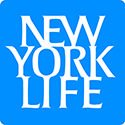
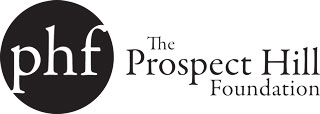



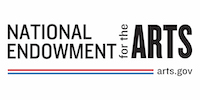
Cocktails, art, and music make a heady mix during K2 Friday Nights, where admission is free every Friday from 6:00 to 10:00 PM.
- Café Serai becomes the K2 Lounge, offering a special drink menu to accompany the evening’s DJ, Joey Greiner.
- Arrive early for 2-for-1 drinks from 6:00–7:00 PM.
- Explore all the galleries, dive deeper with an exhibition tour at 7:15 PM, and kick off your weekend with the Rubin.
Coming with friends? Learn about group reservations and tours.
About the DJ

Joey Greiner has been moving dance floors for over 15 years in his native New York City, across the US, and Europe. He weaves deep and funky grooves with Afro and Latin rhythms to lead you on a journey into your most primal instincts to move your body. His wildly popular Tribal Disco party infuses live instruments and performances with energetic DJ sets, creating an unforgettable interactive experience for the crowd.
Lead support for the Rubin Museum is provided by the Milton and Sally Avery Arts Foundation, Bob and Lois Baylis, Barbara Bowman, E. Rhodes and Leona B. Carpenter Foundation, Noah P. Dorsky, Fred Eychaner, Christopher J. Fussner, Agnes Gund, The Robert H. N. Ho Family Foundation Global, the Estate of Lisina M. Hoch, Henry Luce Foundation, The Pierre and Tana Matisse Foundation, Mellon Foundation, Matt and Ann Nimetz, The Randleigh Foundation Trust, Shelley and Donald Rubin, Tiger Baron Foundation, and Ellen Bayard Weedon Foundation.
General operating support of the Rubin Museum of Art is provided by Daphne Hoch Cunningham and John Cunningham, Anne E. Delaney, Dalio Philanthropies, Janet Gardner, Dan Gimbel of NEPC, Inc., The Prospect Hill Foundation, Basha Rubin and Scott Grinsell, Namita and Arun Saraf, Linda Schejola, Eric and Alexandra Schoenberg, Eileen Caulfield Schwab, Jesse Smith and Annice Kenan, Tsherin Sherpa, Tong-Tong Zhu and Jianing Liu, with generous donations from the Museum’s Board of Trustees, individual donors and members, and corporate and foundation supporters.
This program is supported, in part, by public funds from the New York City Department of Cultural Affairs, in partnership with the City Council.
The Rubin Museum’s programs are made possible by the New York State Council on the Arts with the support of the Office of Governor Kathy Hochcul and the New York State Legislature.








Photo by Filip Wolak
Cocktails, art, and music make a heady mix during K2 Friday Nights, where admission is free every Friday from 6:00 to 10:00 PM.
- Café Serai becomes the K2 Lounge, offering a special drink menu to accompany the evening’s DJ, R Dubbs.
- Arrive early for 2-for-1 drinks from 6:00–7:00 PM.
- Explore all the galleries, dive deeper with an exhibition tour at 7:15 PM, and kick off your weekend with the Rubin.
Coming with friends? Learn about group reservations and tours.
About the DJ
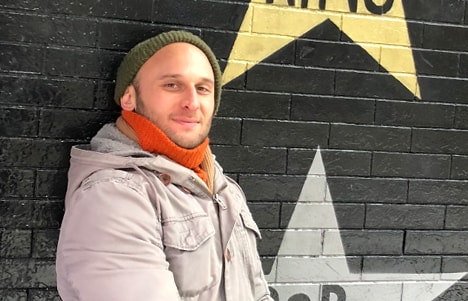
R Dubbs (Robbie Krevolin) loves nothing more than to get you moving to a world of sounds you’ve never heard before, digging deep into the times when genres were blurring, drum machines were plentiful, and systems were made for booming. It’s always love, baby.
Lead support for the Rubin Museum is provided by the Milton and Sally Avery Arts Foundation, Bob and Lois Baylis, Barbara Bowman, E. Rhodes and Leona B. Carpenter Foundation, Noah P. Dorsky, Fred Eychaner, Christopher J. Fussner, Agnes Gund, The Robert H. N. Ho Family Foundation Global, the Estate of Lisina M. Hoch, Henry Luce Foundation, The Pierre and Tana Matisse Foundation, Mellon Foundation, Matt and Ann Nimetz, The Randleigh Foundation Trust, Shelley and Donald Rubin, Tiger Baron Foundation, and Ellen Bayard Weedon Foundation.
General operating support of the Rubin Museum of Art is provided by Daphne Hoch Cunningham and John Cunningham, Anne E. Delaney, Dalio Philanthropies, Janet Gardner, Dan Gimbel of NEPC, Inc., The Prospect Hill Foundation, Basha Rubin and Scott Grinsell, Namita and Arun Saraf, Linda Schejola, Eric and Alexandra Schoenberg, Eileen Caulfield Schwab, Jesse Smith and Annice Kenan, Tsherin Sherpa, Tong-Tong Zhu and Jianing Liu, with generous donations from the Museum’s Board of Trustees, individual donors and members, and corporate and foundation supporters.
This program is supported, in part, by public funds from the New York City Department of Cultural Affairs, in partnership with the City Council.
The Rubin Museum’s programs are made possible by the New York State Council on the Arts with the support of the Office of Governor Kathy Hochcul and the New York State Legislature.








Photo by Filip Wolak
Cocktails, art, and music make a heady mix during K2 Friday Nights, where admission is free every Friday from 6:00 to 10:00 PM.
- Café Serai becomes the K2 Lounge, offering a special drink menu to accompany the evening’s DJ, Kind B.
- Arrive early for 2-for-1 drinks from 6:00–7:00 PM.
- Explore all the galleries, dive deeper with an exhibition tour at 7:15 PM, and kick off your weekend with the Rubin.
Coming with friends? Learn about group reservations and tours.
About the DJ
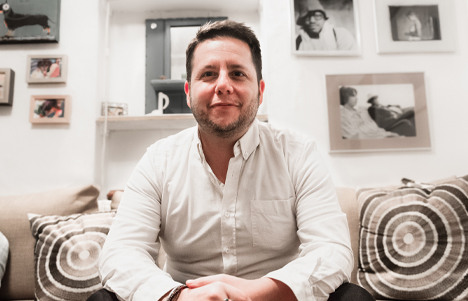
Trained as a classical pianist, DJ KindB crossed over to the DJ circuit more than 10 years ago. KindB’s style represents a wide range of genres that span global electronic music—from Brazilian and Afro-Latin beats to Arabic and Asian grooves.
Lead support for the Rubin Museum is provided by the Milton and Sally Avery Arts Foundation, Bob and Lois Baylis, Barbara Bowman, E. Rhodes and Leona B. Carpenter Foundation, Noah P. Dorsky, Fred Eychaner, Christopher J. Fussner, Agnes Gund, The Robert H. N. Ho Family Foundation Global, the Estate of Lisina M. Hoch, Henry Luce Foundation, The Pierre and Tana Matisse Foundation, Mellon Foundation, Matt and Ann Nimetz, The Randleigh Foundation Trust, Shelley and Donald Rubin, Tiger Baron Foundation, and Ellen Bayard Weedon Foundation.
General operating support of the Rubin Museum of Art is provided by Daphne Hoch Cunningham and John Cunningham, Anne E. Delaney, Dalio Philanthropies, Janet Gardner, Dan Gimbel of NEPC, Inc., The Prospect Hill Foundation, Basha Rubin and Scott Grinsell, Namita and Arun Saraf, Linda Schejola, Eric and Alexandra Schoenberg, Eileen Caulfield Schwab, Jesse Smith and Annice Kenan, Tsherin Sherpa, Tong-Tong Zhu and Jianing Liu, with generous donations from the Museum’s Board of Trustees, individual donors and members, and corporate and foundation supporters.
This program is supported, in part, by public funds from the New York City Department of Cultural Affairs, in partnership with the City Council.
The Rubin Museum’s programs are made possible by the New York State Council on the Arts with the support of the Office of Governor Kathy Hochcul and the New York State Legislature.








Photo by Filip Wolak
Spend your summer Fridays exploring the Rubin’s Museum-wide exhibition Reimagine: Himalayan Art Now from the perspectives of a select group of participating artists. Each talk will feature a different artist who will share the inspiration and experiences behind their work in the galleries. The artist will also engage with other artworks in the exhibition that captured their interest. There will be time allotted for audience questions. Ticket holders will meet at 6:00 PM at the base of the spiral staircase.
This week’s Artists on Art talk will be led by Tenzin Mingyur Paldron.
ABOUT THE ARTIST
Tenzin Mingyur Paldron (he/they)
b. 1984, New Delhi, India; lives and works in New York, NY
Tenzin Mingyur Paldron has a PhD in rhetoric from UC Berkeley and wrote the dissertation Tibet, China, and the United States: Self-immolation and the limits of understanding (2021). The artist later collaborated with Soojin Chang on the film Virtue and the Remaking of Suffering, which features Paldron’s analysis and commentary on a historic letter sent by peace activist Thich Nhat Hanh to civil rights leader Dr. Martin Luther King Jr. in 1965.
Through art and dialogue, Tenzin Mingyur Paldron has worked to elevate LGBTQIA+ perspectives and address issues of sexual violence in the Tibetan diaspora. The artist is developing the Tibet Learning Series which is preceded by the online archive Tibet x Decolonial Atlas and his talk series Truth at the Margins on racism and disinformation in the media regarding Tibetans. They are also writing a research memoir entitled Transgender Road Diaries: A Tibetan Adventure.
Tenzin Mingyur Paldron’s new work Power, Masculinity, and Mindfulness comprises four films and videos that source exchanges between the artist and his father to engage wider world issues and Tibetan realities. Through them the artist invites viewers to contemplate their own nuanced perspectives, fallibilities, and resources.
paldron.com / @doctenzin
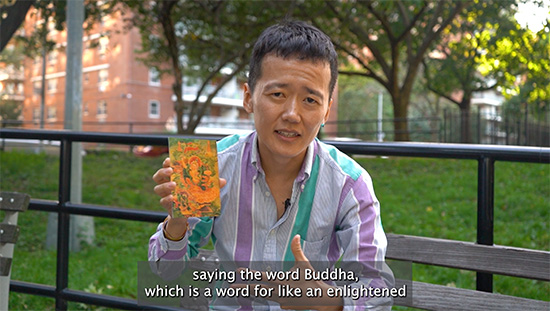
Reimagine: Himalayan Art Now is supported by Bob and Lois Baylis, Daphne Hoch Cunningham and John Cunningham, Noah P. Dorsky, Mimi Gardner Gates, Fred Eychaner, Jacques and Natasha Gelman Foundation, Dan Gimbel of NEPC, LLC, Agnes Gund, New York Life, Matt and Ann Nimetz, Namita and Arun Saraf, The Prospect Hill Foundation, Eileen Caulfield Schwab, Taipei Cultural Center in New York, and UOVO.
This program is supported, in part, by public funds from the New York City Department of Cultural Affairs, in partnership with the City Council.
The Rubin Museum’s programs are made possible by the New York State Council on the Arts with the support of the Office of Governor Kathy Hochul and the New York State Legislature.
This project is supported in part by the National Endowment for the Arts.



